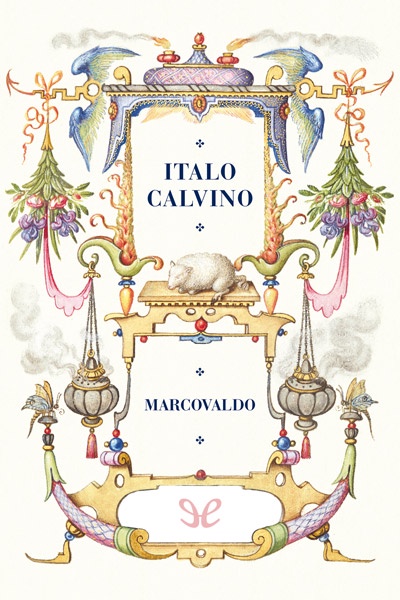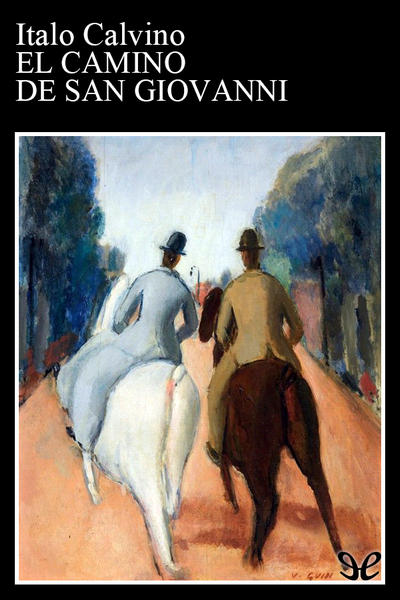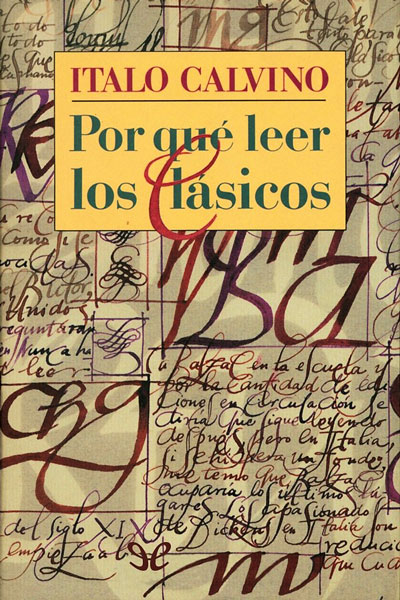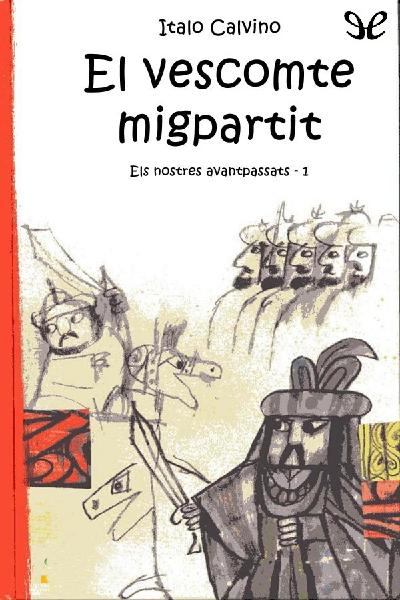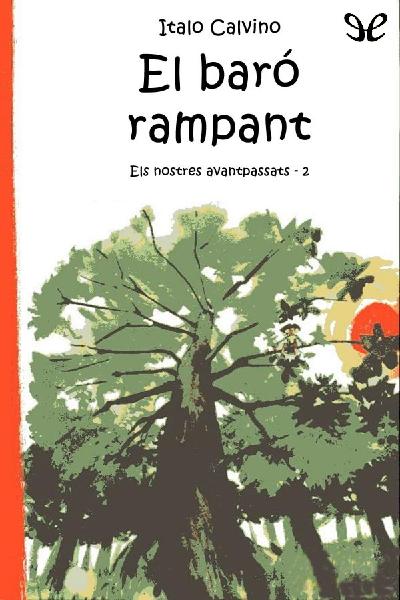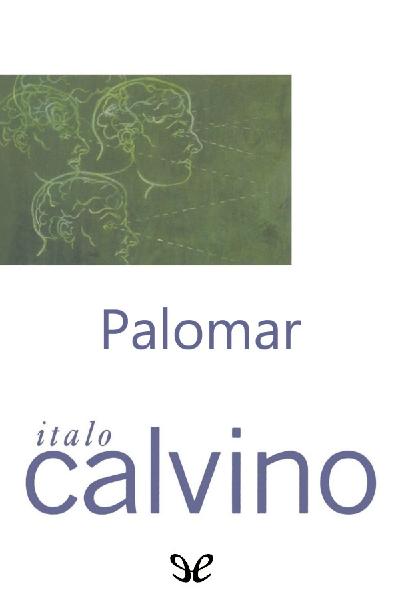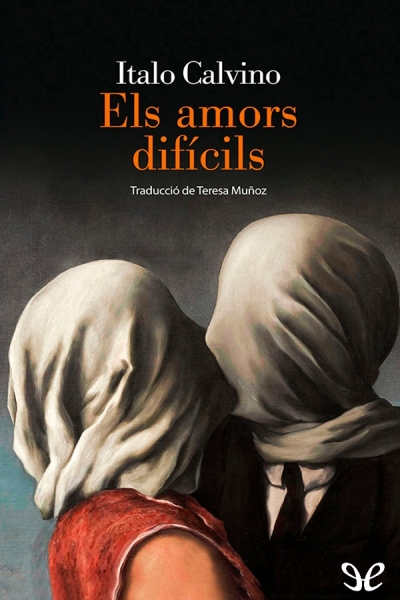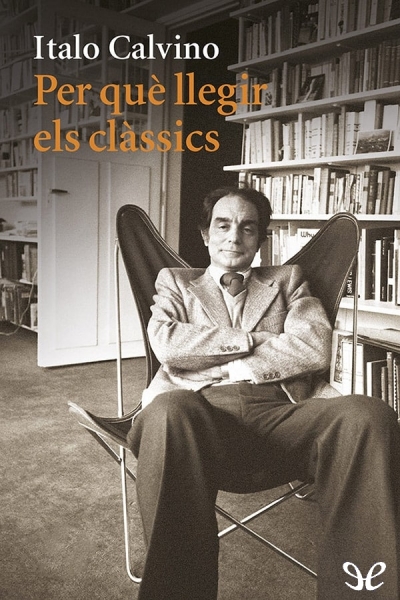oleebook.com
El cavaller inexistent de Italo Calvino
de Italo Calvino - Género: Fantástico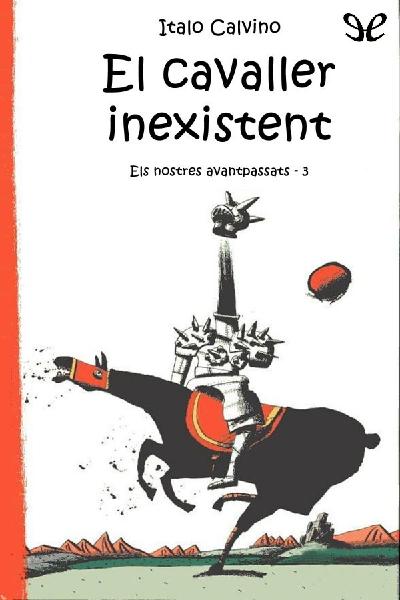
Sinopsis
«El cavaller no féu cap gest; la seva mà dreta, enguantada amb una manyopla de ferro ben articulada, estrenyé més fort larçó, mentre laltre braç, que aguantava lescut, era com sacsejat per un tremoleig. Us ho dic a vós, ei, paladí! insistí Carlemany. Com és que no ensenyeu la cara al vostre rei? La veu sortí clara del gorjal: Perquè no existeixo, senyor.»Amb aquestes paraules ens presenta Calvino el seu estrany personatge: El cavaller inexistent. La sàtira de Calvino ens afecta directament, interessa lhome davui, perquè les situacions que hi descriu són ben actuals. I és que enmig dels fets grotescos, de batalles, duels i naufragis, no tardem a descobrir la seva força: una moral activa i una actitud irònica i melangiosa, una aspiració a la plenitud de la vida, a la humanitat total.
Libros Recomendados - Relacionados
Reseñas Varias sobre este libro
My favourite story in this collection is The Baron in the Trees which is a wonderful fairy tale about a kid who wouldn't finish his dinner, decides to live in a tree, and crosses Europe from Italy to southern Spain without once touching the ground. It is a beautiful, masterful tale that reminds us how man in the last 6 or 7 centuries has destroyed many of the forests and natural diversity that existed on the Mediterranean coast in the middle ages. It can be read again and again and is absolutely captivating. That reminds me that I still need to read it to my kid!
The other two stories in this collection, The Cloven Viscount and The Non-Existent are both exemplary of the softer more dreamy side of Calvino's writing and incredible imagination. fiction italian-20th-c kids ...more58 s Argos1,125 363
Calvino bu kitapta 50'li ve 60'l? y?llarda yazd??? ikisi k?sa üç roman?n? Atalar?m?z ba?l??? alt?nda toplam??. Neden böyle yapt???n? kitab?n sonunda yazd??? sonsözde anlatm??.
Dü?sel-masalc? gerçekçili?in en uç beylerinden olan Calvino ola?anüstü mizah zekas?n?, ciddiyet ile zekice espri anlay???n? birle?tirerek sergiliyor. Hiciv, i?neleme, ironi, kara mizah gibi ö?eleri kolayca kullan?yor. Günlük deyi?le kafa buluyor, dalga geçiyor, makaraya (sakaraya) al?yor. Gülümsetirken ya da güldürürken dü?ündürüyor, bir anda masaldan ç?k?p felsefik bir metine ittiriveriyor.
Üç öyküde de sava? ve din kar??t? ö?eler aç?kça yer al?yor. Üç hikayeyi üç ayr? çevirmen çevirmi?, bu nedenle biraz tat kaç?r?c? durumlar var. Yap? Kredi Yay?nlar? i?in kolay?na kaçm?? galiba.
Yazar?n kitab? yazma gerekçesi olarak, Marx'a göre kendine 'yabanc?la?m??', Freud'a göre 'bast?r?lm??' ça?da? insan?n atalar?n?n soya?ac?n? ç?karma iste?ini vurguluyor. Bu giri?imini son sayfalardaki aç?klamas?nda ?öyle ifade ediyor;
Ben, varl???n? insano?lu olarak gerçekle?tirme yolundaki deneyimleri konu alan bir üçlü yazmak istedim: Varolmayan ?övalyede varl???n fethedili?i, ?kiye Bölünen Vikontta toplumun dayatt??? k?r?lmalar?n ötesinde bir bütünlü?e ula?ma arzusu, A?aca Tüneyen Baronda ise bireysel bir kendini belirleme eylemine ba?l?l?k sayesinde ula??lacak bireysel olmayan bir bütünlü?e ileten bir yol : özgürlü?e yakla?man?n üç basama??......... Dilerim ça?da? insan?n atalar?n?n soya?ac? olarak görülsünler.
Calvinoyu tan?mak için, onun fantastik, masals? dünyas?n?n sert gerçekleri nas?l anlatt???n? görmek için, biraz da olsa gülmek için okuman?z? öneririm.40 s Jan-Maat1,597 2,185 Read
If these are our ancestors then we do indeed have a troubled and difficult inheritance, although it could be that the collection title is the gift of the publisher. This collection of three Calvino stories features partial people, an empty suit of armour, a half man, chopped in half by a war would and a baron who doesn't have his feet on the ground.
Apparently then we are in the world of fables, are they critical views of our heroic past? Or simply games toying with notions? The great heroism of Charlemagne and his paladins is empty - not exactly a surprise after The Song of Roland, when one might well suspect that the heroes are some kind of mechanical mincers released on to the battlefield. And are we being brought to perceive of the Rococo and Enlightenment as periods when people had their heads in the clouds and couldn't keep their feet on the ground? A set of charming cultural jokes then, which is perhaps not so far in attitude from If on a winter's night a traveller.
On the whole these were my least favourite Calvino stories, which means I still recommend them highly to the curious reader.20th-century italy novel ...more17 s Trevor1,345 22.8k
Calvino is probably my favourite writer. His books are as varied and beautiful as it is possible to be. For a long time I tried to learn Italian in part so as to be able to read him in the original language. These are a fascinating series of stories, almost stories for young adults, but also allegories on a world divided into East and West.
My favourite of these stories is Baron in the Trees. The tale of a young man who fights with his family, storms out of the house in a fit of fury and climbs a tree saying he will never come down - and never does.
Un many of Calvino's other books this is straight narrative and wonderful story telling by a master story teller. Not a bad place to start a journey into Calvino.literature16 s merixien603 457
Bu üçleme Terra Nostra sonras?nda ihtiyaç duydu?um zihin dinlendirmesinde bana s???nak olmu?tu. Zira nas?l tarif edece?imi bilemedi?im ?ekilde, oldukça kar??t durum ya da konular?n üzerine kurgulanan, bakt???n?zda hiçbir inand?r?c?l??? olmayan hatta mant?k d??? görünmesine kar??n asl?nda ne kadar almak isterseniz o kadar?n? sunan yeti?kinlere yönelik olsa da her ya?? kapsayabilen peri masallar?yla kar?? kar??yas?n?z. Gerçekli?in kurallar?ndan tamamen kopuk görünen atalar?m?z?n dünyas?nda, asl?nda her ?ey kimlik kavram?na, insan?n ruhunda ta??d??? ve yetersizlik- zay?fl?k gibi gördü?ü her kar??tl?kla asl?nda tam bir insan olmas?na, d??lanmay? göze alarak toplumsal kurallara-geleneklere ba? kald?rabilme gücüne ya da ça?da? bireyin rasyonelli?ine, var olma durumuna özetle ça?da? insan ve topluma dair çokça alegorik mesaja ç?k?yor asl?nda.
Bu arada sizi çok yormayan daha kolay okunan kitaplar olmas?na kar??n Calvinonun al??t???n?z ?iirsel anlat?m?ndan çok uzakla?mad???n? ancak özellikle de birinci ve üçüncü kitapta daha çok masal anlat?m?na evrildi?ini söyleyebilirim. Aç?kcas? Calvinodan masal dinlemek muazzam bir deneyim oldu?undan bu de?i?im beni rahats?z etmedi. Son olarak Atalar?m?z ile bu üç ayr? edisyon aras?nda çok bariz farkl?l?klar olmasa da çizimlerle birlikte baz? durumlarda kelime tercihleri ile ifadenin yumu?at?lmas? ve böylece olay?n alt anlama saklanmas? gibi hafif müdahaleler var elbette. Dokuz ya??ndaki bir çocu?un da bir yeti?kinin de okudu?unda farkl? bir ?eyler bulup tatmin olmas?n? sa?layan da -alegorik anlat?mla birlikte- bu zaten. Özetle sakin ve rahat okunan ama yine de size bir ?eyler verecek ya da çocu?unuzla-ye?eninizle vs. ortak bir ?eyler okuyup onu da Calvino ile tan??t?rmak istiyorsan?z ?ahane bir seçim olacakt?r.italian-literature read-in-202328 s Cristina Di Matteo706 25
I NOSTRI ANTENATI di Italo Calvino con le illustrazioni di Emanuele Luzzati, Maria Enrica Agostinelli e Federico Maggioni. Una raccolta preziosa in cui l'autore disegna, tramite atmosfere surreali, «una trilogia sul come realizzarsi esseri umani» attraverso tre personaggi memorabili. Da 12 anni <3 https://ilmondodichri.com/i-nostri-an...
#inostriantenati #mondadori 14 s Eylül Görmü?515 2,941
"Öykücüyle sava?ç?y? ayn? ki?i yapt?m - akl?ma son anda gelen bir sürpriz bu, san?r?m size söyledi?imin d???nda hiçbir özel anlam ta??m?yor. Ama siz ille de, ne bileyim, içselle?tirici zekayla d??a dönük canl?l???n bir bütün olmas? gerekti?i anlam?na falan geldi?ini dü?ünmeyi ye?liyorsan?z, o sizin bilece?iniz i?."
Kitab?na dair bunu diyen bir yazar?n eseri nas?l yorumlanabilir? En korktu?um ?eydir bir esere özünden fazla anlam yüklemek, yazar?n hiç niyet etmedi?i ?eyleri tuhaf yap?sökümlerle esere atfetmek, edebiyat? teknik bir meseleye indirgemek. Ancak Calvino'nun biraz fazla tevazu gösterdi?ini söylemek laz?m, zira bu 3 acayip "masal", "öyle akl?ma geldi?i gibi yazd?m"la aç?klanamayacak denli müthi?.
Biraz de?i?tirilmi? halleriyle ve onlara e?lik eden çizimlerle hem ayr? ayr? birer kitap olarak, hem de Calvino'nun tercihiyle "Atalar?m?z" ba?l??? alt?nda beraberce de bas?lan üç novella; ?kiye Bölünen Vikont, A?aca Tüneyen Baron ve Varolmayan ?övalye'yi yazarken Calvino'nun bir derdi varm?? elbette. So?uk sava? döneminde, politik olarak gergin bir dönemde, kendini ifade etmekte güçlük çekerken; "direni? edebiyat?"n?n unsurlar?n? geçmi? bir zamanda, olmayan diyarlarda geçen öykülerde kullanmay? denemi?, kendini bu biçimde daha özgür hissetmi?. ?lk bak??ta uçuk kaç?k masallar gibi gözüken bu öyküler, asl?nda ilk bak??ta göründüklerinden çok daha politik metinler.
Ama zaten göründükleri yal?n halleriyle de ziyadesiyle güzeller. Uzak bir gelecekte uzayda geçen Kozmokomik Öyküler'in tam kar??t? bir evrende vuku buluyorlar ve fakat ayn? hissi ve lezzeti sunuyorlar okura. Her Calvino bitirdi?imde akl?mda ye?eren soru yine beliriverdi yani: "bu nas?l bir deha ya?"
Calvino'nun dünyalar?nda gezinmeye bay?l?yorum. Birbirine çok benzeyen ve hiç benzemeyen evrenlerindeki o tuhaf, absürt, uçuk hikayelerini dinlemenin lezzeti sahiden e?siz.
?çlerinden en çok Varolmayan ?övalye'yi sevdim ama ay?rmak zor sahiden. Bu arada ?kiye Bölünen Vikont'ta k?saca da olsa Calvino'nun hayali kentlerinden biri olan Zaira'dan bahis açmas?, benim o hiç var olmam?? ?ehri Görünmez Kentler'den hat?rlay?p "ah" demem de bu kitaba dair nefis bir hat?ra olarak kald? bana. ??12 s Pavle443 166
Tri Kalvinova dela spojena od strane njega samog u jednu tematsku trilogiju o naim precima: ?oveku dobra i zla, tvrdoglavom idealisti i vitezu koji je sam sebe ubedio da postoji.
Prepolovljeni knez/vikont (4+) je novela, a po duhu oduena pripovetka, o jednom, gle ?uda, knezu, koji biva, gle ?uda, prepolovljen u ratu, i to u luni-tuns meku gde top ne napravi rupu samo u stomaku, ve? odnese ?itavu jednu stranu tela. I tako, vra?a se na knez koji spreda izgleda kao iz profila u rodno mu selo, sa blagim poreme?ajem li?nosti. ?ak i da ne pie na naslovnoj, znao bih da je pisac Kalvino. Pripovetka koja je, iako moda ne toliko suptilna u svojoj alegoriji, u svakoj meri posebna i zabavna i smena i dirljiva, sa neverovatno simpati?no izgradjenim likovima u tek neto preko devedeset strana. Uvek se uplaim da ?u da se naviknem na s koje Kalvino prua. Raduje me to se to jo nije dogodilo. A kakve s prua...
Kada je re? o Baronu na drvetu (4+), ostavi?u prikaz na citatu, odnosno razgovoru Kozima, naslovnog barona, i jednog vojnika u prolazu:
You see... War... For years now Ive been dealing as best I can with a thing that in itself is appaling; war... and all this for ideals which I shall never, perhaps, be able to explain fully to myself...
I too, replied Cosimo, have lived many years for ideals which I would never be able to explain to myself; but I do something entirely good; I live on trees.
?udno je re?i za Kalvinov roman da je obi?an ili (relativno; ipak je osnova narative o klicnu koji odbije da ve?era i ode da ivi u kronjama do kraja ivota) normalan, ali ovaj to jeste, bez obzira na ekcentri?nost pri?e ali je i lep, nean, miran, i iako na kraju malo otaljan, celovit.
Nepostoje?i Vitez (5) ja ba ono to mi je trebalo od Kalvina zabavan, mojtipantonovski viteki roman/novela. I toliko mi je ao to nije dui, ali i ovako je izrazito simpati?an i drag.
Za mene, Kalvino ne zna za poraz ovo je jo jedna prili?no ubedljiva knjiga, ali naalost i jo jedna manje njegove bibliografije koja mi ostaje. Mislim da ?u sad malo da postim, ?isto kako bi mi ivot na due staze bio lepi.
4+ (samo zbog genijalnosti Putnika i Gradova)
tzv-ostalo-tzv-ozbiljno11 s Srdjan43 18
Prva dva romana trilogije (Vitez koji ne postoji i Raspolovljeni viskont) su filozofske bajke, fantasti?ne, alegori?ne pri?e smjetene par stotina godina u prolost, ali tematski posve?ene savremenim filozofskim pitanjima ?ovjekovog otu?enja i smisla postojanja u svijetu. Nisam imao naro?itu elju da bistrim egzistencijalizam, pa sam ih ?itao kao komedije apsurda, i stvar je dosta dobro funkcionisala na taj na?in, jer Kalvino pie dosta lagano, zabavno, i pored tekih misaonih tema u pozadini. Ipak, nisam siguran da knjige nude dovoljno ?itaocima ?ije primarno interesovanje nije filozofija.
Me?utim, Barun penja?, tre?i dio serije, mnogo vie mi se dopao. Fantasti?no ovdje ustupa mjesto bizarnom, ili grotesknom, pa alegorija vie nije jedini klju? za ?itanje knjige. Pri?a o baronu Kozimu koji se sa dvanaest godina posva?a s ocem i ostatak ivota, dugog i sadrajnog, provede na drvetu o?ito nosi filozofske ideje, ali je knjievno dora?enija, sa likovima koji djeluju kao ljudska bi?a, a ne tek modeli za predstavljanje filozofskih koncepata, to je bio slu?aj u Vitezu i Viskontu. Tako?e, vrijeme radnje je blie naem, teme kojima se bavi su konkretnije, recimo prosvjetiteljstvo i drutveni ugovor. Kozimo se doti?e stvarnih istorijskih doga?aja, dopisuje se sa francuskim enciklopedistima, ?ak upoznaje Napoleona.
U raznim fazama ?itanja knjiga me znala podsjetiti na Toroov Volden, na Robinzona Krusoa, ?ak i na Haklberija Fina, jer osim to nudi alternativni pogled na ljudsko drutvo, knjiga je i apoteoza prirodi, slobodi i pobuni, ivotu u dimenziji blago pomjerenoj u odnosu na uobi?ajenu. Knjievno dore?ena i idejno inspirativna, tre?a knjiga Kalvinove trilogije baca prethodne dvije u duboku sjenku, ?ak toliko duboku da mi se ?ini da njihovo zajedni?ko objavljivanje (i takvo ?itanje) nemaju mnogo smisla.11 s Inderjit Sanghera450 105
This triptych of stories, in which Calvino coalesces fantasy, folk-tale and pastiche into a set of wonderful, irreverent and beautiful stories and represents one of the high points in Calvinos oeuvre. The Cloven Viscount is the story of a viscount whose body is split into two by virtue of jumping in front of a cannonball. In a kind of macabre re-working of the double theme-and in particular Dr Jekyll and Mr Hyde-one side is evil and the other good and the viscount is able to terrorize his subjects in turns via both his piety and malevolence. Calvino explores the duality of human nature, upending the traditional double theme by having his the good side of the viscount be as harmful as the bad with his constant hectoring and sermonizing and of the importance of having a variety of facets to your personality-the sense of incompleteness haunts both the good and bad halves of the count and it is only be joining together the both that he is able to re-enter the human world.
The best story, however, is Baron In The Trees, the story of a young aristocrat who decides, in a fit if pique over having to eat snails, to spend the rest of his life in trees. Not only does the story explore the lost landscape of Ligurian Italy-as Calvino said most Italian Literature is regional by nature and Calvino is able to recreate the Barons arboreal kingdom wonderfully well, but it also expands the ideas in The Cloven Viscount on nature of the self, but also of individuality and the importance of living life against ones own principles and ideals and not bowing down to societal norms and pressures. A character in a novel by another writer who explored similar themes-Tolstoy-make an appearance, as the Viscount encounters a lachrymose Russian soldier named Pierre. Despite-or perhaps because of-his unusual lifestyle, the Baron is able to live a rich and meaningful life, a life full of joy, pain, heart-break, violence, wisdom and madness and which is resplendent with beauty.
The Non-Existent Knight is a light-hearted pastiche of the pastoral novel, in which a knight who solely exists externally as a suit of armour, is attended to by a squire who has no concept of his inner existence and who constantly mistakes himself for a duck, or becomes confused at to whether he should be eating his food or his food should be eating him. Exploring notions of existence and sentience, The Non-Existence Knight is the funniest story in the collection and acts as a kind of loving rejoinder of the clichés and tropes of stories of knight errantry.
A truly beautiful collection of stories which are well worth a re-visit.
10 s Metodi Markov1,487 363
?? ?? ???? ????? ????????? ???????, ????? ? ???????? ?????? ? ?????? ?? ????? ????? ????!
???????? ?????? ???? ??????? ?????? - "????????????? ??????", ????? ? 2*. ????? ??????? ?????????, ?? ?? ????? ????? ?????? ?????? ? ??????
????? ????? ?? ?? ???? ? ?????, ????? ? ??????? ???????? ????, ?? ?????? ?? ??????? ?????????? ?? ? ?? ???. ??????? ??????????? ?????? ??????????.2021 dnf trash-bin11 s Matthew Ted862 849
I reviewed all three stories separately. The Baron in the Trees is brilliant, 5 stars and more, but the other two are 4 stars - equalling the collection out to 4.
The Cloven Viscount Review Here
The Baron in the Trees Review Here
Non-Existent Knight Review Here1001-list-2006-ed 20th-century lit-writ-italian ...more10 s Sirunmanug136 9
Bugün sorun, insan?n benli?inin bir bölümünü yitirmesi de?il art?k, tümünü yitirmesi, hiç varolmamas?d?r. Üçü de var olmam?? kahramanlar?n dü?ündürdükleri.10 s Ezgi252 16
Italo Calvino uzun zamand?r okumak istedi?im bir yazar. Edebiyat?na ba?lamak için önerilen kitap Atalar?m?z. ?ki uzun öykü bir de romandan olu?an bir üçleme. Her biri tekil olarak okunsa da art arda okunmas? daha isabetli olur. Calvino da sonsözünde bir araya getirme amac?n? aç?kl?yor.
?kiye Bölünen Vikont favorim oldu. Sava?ta ald??? yaralarla bedeninin yar?s?yla gelen kontu anlat?yor. Döndü?ünde herkese hayat? dar ediyor. Çünkü gelen yar? kontun kötü yan?d?r. ?nsan?n içindeki iyili?i ve kötülü?ü, insan olman?n yükledi?i ahlak? masals? bir ?ekilde anlat?yor.
A?aca Tüneyen Baron kitaptaki en uzun k?s?m. Baronun ailesine k?zarak -öyle sudan bir sebep ki- topra?a basmama inad?n? anlat?yor. Art?k a?açlarda ya?amaya ba?l?yor. Harika bir inat ve her ko?ulda insanl???n onurunu ta??ma öyküsü. Komik durumdaki baron a?ac?n üzerinde ava da ç?kar, e?k?yalarla da kar??la??r hatta a??k bile olur.
Varolmayan ?övalye ise bedensel olarak olmayan bir ?övalye ile bedeni oldu?u halde bilinci olmayan adam?n çat??mas?n? anlat?yor. ?ki öykünün yan?nda biraz sönük kalsa da zihin beden ikilemini problematik haline getirmi? olmas? bile öyküyü okumak için yeterli.
Büyülü gerçekçili?i çok seviyorum. Daha önce hiçbir stilin olmad??? ölçüde simgesel anlat?ma uygun bir stil. Avrupa roman?nda önemini kaybeden insanmerkezcili?i romana yeniden kazand?r?yor. Calvino da bunu harikulade bir ?ekilde uygulam??. Soyut olmayan hiçbir ?ey yok. Sava?lar, inançlar, a?klar ve türlü garipliklerin hepsi gerçek. Bu büyülü dünya ile insan?n soya?ac?n? ç?karmak çok iyi bir fikir. Kitap yap?lan tüm övgüleri hak ediyor. 9 s Dhanaraj Rajan473 336
The stars should be four and half.
I now realise that I can not get enough of Italo Calvino. He entertains and amazes me all the time. In fact I began his "Invisible Cities" first and then read his "If On a Winter's Night a Traveller." Both of them are his later writings and they are very post-modern. I loved both of them and then when I picked this up (One of his earlier works) I was prepared myself to face the intellectual challenge. But then I found myself in the fairy world. This book contains three fairy tales/folk tales/moral tales (or may be folk novellas). That was a pleasant surprise.
About the three novellas:
"The Cloven Viscount" speaks of a man halved into two and both his parts roam around in the village one doing good and the other doing bad.
"Baron in the Trees" speaks of "a man born on the earth but lived on the trees and disappeared in the sky." It speaks of a man who chose to live his entire life on the trees. Because according to him the view from the trees helped him to see the earth better.
"Non Existent Knight" speaks of an empty armour serving the army of the king Charlemagne.
The narrations seem very simple. But the actual reading gives the attentive and a literary reader plenty to ponder over. In a simple fairy tale the history of Italy and Europe with emphasis on French revolution and the Muslim occupation of Spain, the philosophical opinions (Communism and feudalism) and psychological insights and many other reflections on human nature and history are all splattered. They do not interrupt the progress of the story. In fact, they are part of the story and a knowledge of it would lend the reader a different reading. If a reader is happy enough only to pass the time by reading a book, these would serve as simple fairy tales.
Calvino was truly a story teller. He knew how to entertain everyone.
favorites folklore italian-lit ...more9 s The Frahorus877 92
Uno più bello dell'altro, anche se a me ha colpito "Il cavaliere inesistente".italiana mondadori romanzo9 s Josefina Wagner519
Bu kadar ilginç zekice yaz?lm?? olan 3 hikayeyi de severek okudum. Oldukça absurd ama bir o kadarda güldüren harika bir kurguyla yaz?lm??. Aç?kcas? bu kadar iyi olaca??n? dü?ünmemi?tim.cultural european-literature fiction ...more14 s Ilaria_ws893 67
"Le cose che voleva dire lui non sono lì, è altro che lui intendeva, qualcosa che abbracciasse tutto, e non poteva dirla con parole ma solo vivendo come visse. Solo essendo così spietatamente sè stesso come fu fino alla morte, poteva dare qualcosa a tutti gli uomini."
I nostri antenati è il volume che raccoglie i tre romanzi della trilogia che Calvino descrisse come "un albero genealogico degli antenati dell'uomo contemporaneo." Il visconte dimezzato, il barone rampante, il cavaliere inesistente. Sono anni che mi riprometto di leggerli e finalmente mi sono decisa e ho acquistato il volume che li contiene tutti. Di Calvino ho già amato Se una notte d'inverno un viaggiatore, ma devo ammettere che non ero pronta alla bellezza e alla magia contenute in questi racconti. Si tratta di tre storie ambientate in epoche diverse, che si svolgono spesso in luoghi lontani e che hanno per protagonisti tre uomini, completamente diversi l'uno dall'altro ma accomunati dalla stessa voglia di libertà, dallo stesso bisogno di sentirsi, in modi diversi umani. Si tratta di un'allegoria, ricca di elementi che traggono spunto dal fantastico, ma che nel suo essere così sui generis riesce ad essere profondamente umana.
Il visconte dimezzato, il più breve dei tre, narra la storia del Visconte Medardo di Terralba che parte per dare il suo contributo nella guerra contro i Turchi. Durante la sua prima battaglia Medardo viene colpito da un colpo di cannone e si ritrova diviso a metà. A casa torna solo il suo lato destro che ben presto si scopre essere quello cattivo, la parte malvagia che lo porta a compiere le nefandezze più orribili. Nel Barone rampante invece, che è il romanzo più corposo, leggiamo la storia di Cosimo di Rondò che appena dodicenne, dopo una lite col padre, si rifugia su un albero e decide di non scendere più. Cosimo vivrà una vita intera sugli alberi, in una dimensione tutta sua che però si scoprirà essere molto vicina agli altri. Infine nel Cavaliere Inesistente leggiamo del cavalier Agilulfo, uno dei paladini del seguito di Carlo Magno. Cavaliere coraggioso e dalla bianca armatura, Agilulfo in realtà non esiste, è solo involucro vuoto.
Questi tre romanzi, pur essendo ambientati in epoche e luoghi diversi e avendo per personaggi tre uomini che hanno poco in comune, rappresentano però la sintesi di alcune delle più comuni caratteristiche dell'uomo moderno. Con uno stile ricercato, scorrevole, elegante e particolarmente ironico, Italo Calvino ci conduce alla scoperta di tre racconti allegorici, quasi magici, un'intera collezione di brillanti metafore sulle virtù e le debolezze degli uomini.
I tre racconti mettono in scena dei temi che restano sempre attuali. Nel primo romanzo si parla di incompletezza; parlando di Medardo che si trova diviso letteralmente a metà, si comprende perfettamente che in realtà siamo tutti incompleti, che in un modo o nell'altro tendiamo a concentrarci su una parte di noi e a trascurare le altre.
Cosimo invece, nel Barone rampante che è sicuramente il mio preferito tra i tre, ci insegna l'importanza di avere un punto di vista diverso, di rimanere sè stessi, anche a costo di passare per pazzi, di essere fedeli a quello che siamo. Solo rimanendo pienamente sè stesso, fedele alla promessa fatta, Cosimo riesce a comprendere e a vedere cose che agli altri sfuggono. Essere sè stessi, rifiutare gli schemi imposti dalla società, non adeguarsi, sono tutte qualità che Cosimo incarna. L'onestà, il coraggio e l'acume di Cosimo mi resteranno nel cuore.
Infine Agilulfo, il cavaliere che non esiste ma che incarna tutte le qualità dei paladini del Re. Agilulfo rappresenta in parte la finzione, quello che non esiste, l'armatura che tutti noi indossiamo e che nasconde quello che in realtà abbiamo dentro, il contrasto tra l'apparire e l'essere. Come si legge nel testo "Neppure noi sapevamo d'essere al mondo...Anche ad essere si impara..." Inutile dire che oltre ai temi principali di cui ho parlato il racconto è ricco di molti altri temi. Gli spunti di riflessione sono pressoché infiniti.
Ho amato ogni pagina di questa trilogia, ho trovato tutto così bello, così magico, così inusuale. Calvino ha scritto dei racconti che a primo impatto potrebbero sembrare delle favole ma che in realtà nascondono un mondo intero. Racchiudono tutto quello che di bello e di brutto abbiamo in noi, tutto quello che ci contraddistingue come esseri umani. E' anche un'accurata analisi psicologica dell'uomo contemporaneo, delle sue inclinazioni, delle sue qualità, dei suoi difetti. Parliamo ovviamente di un'allegoria, quindi molti dettagli dei racconti, molte sfaccettature dei personaggi sono portate all'estremo. Vi assicuro però che vi sembrerà di leggere di voi stessi. E se non è questa magia, allora io davvero non so cosa sia.favorites8 s erica44 8
"Se infelice è l'innamorato che invoca baci di cui non sa il sapore, mille volte più infelice è chi questo sapore gustò appena e poi gli fu negato."
Sempre meraviglioso.7 s Tim Pendry1,046 398
This volume pulls together two novellas and one novel written across the length of the 1950s by Italo Calvino as partial pastiches of past literature, all with an implied commentary about the position of the intellectual in post-war Italy.
This tells us all we need to know about the strengths and weaknesses of the work.
On the one hand, Calvino writes fluently and with a mastery of the forms he is working with the (comic) Gothic novel, the moral tale of the Enlightenment and the courtly romance but he is soon falling into the post-modern trap of saying very little of any depth extremely well.
Why is this? Perhaps it is because he is embarrassed. He is a bourgeois intellectual and instinctive aesthete who wants to be a socialist in an age of hard-nosed Marxists. He is trying to keep his nose high from the stench of politics and compromise while being a man of the Left.
How does he try and do this. By metaphorically staying up in the trees and trying to appropriate the great European literary tradition for a basic liberal decency that reminds us of the similar and often not quite convincing efforts of Camus to do the same in 1950s France.
Calvino tries lightness of touch instead of trying to meet the sour-pusses of the old Left on their own puritan ground as Camus did. This means that the works are (mostly) enjoyable but also rather shallow, a case of educated bourgeois knowingly speaking unto educated bourgeois.
For all the claims Calvino was to make about abstracting the authentic vision of the common man from traditional literature (exemplified by his remarkable knowledge of folk tales), his work requires a fair amount of education to appreciate fully. There is an inherent snobbisme in it.
The stories of good and evil disembodied in the cloven viscount, the young aristocrat who takes to the trees and stays there and the knight who is perfect but does not exist are all well told and give an insight into the minds of an elite uncomfortable with modernity and yet committed to it.
The contrast with Di Lampedusas The Leopard, published around the same time, coming, in this latter case, from a genuine aristocrat whose compromise with modernity came from necessity and not from ideology, is striking.
The bourgeoisies continuing interest in the aristocracy is amusing. They will not let go of the past. Our genuine aristocrat can (paradoxically): he speaks of the past as the past whereas Calvino tries to bring the past into the future, turning tragedy perhaps into farce.
Italo Calvinos short introduction is worth reading in this context. He refers to his initial engagement with the post-war fashion for social realism after the victory of the partisans over Mussolini but (in his late twenties) decided to follow his heart and Robert Louis Stevenson.
This tension between his literary aestheticism and the politics of engagement are being worked through in these works and that is why they are good but not great. They are neither one thing nor the other the politics is obscure and the adventuring cloaked in too much implicit meaning.
In the end, it is all too clever by half. It makes you feel superior for understanding things the hoi polloi wont get but there is no way this is a voice for the common man interesting, amusing but locked in its time and in the past simultaneously.
black-comedy cultural-studies heroic-fantasy ...more7 s Samuele Petrangeli415 68
Composto da tre dei romanzi italiani più conosciuti - vista la loro lettura obbligatoria in qualsiasi scuola da decenni -, non credo abbia alcun valore aggiungere nulla sui tre scritti. Sia perché è stato detto più o meno tutto e il contrario di tutto a riguardo, e ci sarebbe spazio giusto per l'opinione personale legata alla mia sensibilità di lettore che vale zero, ma soprattutto perché è lo stesso Calvino, al termine di questa raccolta, in un saggio di una decina di pagine a sviscerare tutti e tre i suoi romanzi.
Allora, forse, anziché parlare dei tre romanzi, secondo me è più interessante la nota finale di Calvino (ok, forse c'entra il fatto che, a parte il gusto per la frase di Calvino, ho trovato tutti e tre i racconti, piuttosto distanti dalla mia sensibilità e dai miei interessi, e già dopo la terza pagina di questo gioco post-moderno fiabescolo, avrei voluto soltanto urlare). In questo saggetto finale, Calvino esemplifica quello che è il romanzo post-moderno, proprio in uno dei primissimi momenti del romanzo post-moderno. La caratteristica che emerge e che contraddistingue i tre romanzi di Calvino è la loro consapevolezza di essere un puro gioco letterario. Tutti e tre, infatti, si rifanno consapevolmente a un preciso modello narrativo - "Il Visconte dimezzato", Stevenson e simili; "Il barone rampante", il romanzo filosofico settecentesco alla Candido; "Il cavaliere inesistente", i romanzi cavallereschi - e ci giocano, fingono di esserlo, consapevoli di non esserlo veramente con una consapevolezza tutta moderna. Cioè: Calvino non sta facendo un romanzo filosofico settecentesco, bensì un romanzo novecentesco che finge consapevolmente di essere un romanzo filosofico settecentesco. Da qui il pastiche, personaggi che sono idee ambulanti, il gioco con la lingua e i riferimenti. Il tutto, ovviamente, non è fine a se stesso e serve come riflessione a Calvino per parlare dell'uomo moderno. Il titolo della raccolta "I nostri antenati" riflette un po' anche l'altra caratteristica della letteratura post-moderna dopo la riflessione su se stessa: l'ironia. Perché è ovvio che di antenato nei romanzi di Calvino non ci sta nulla e che sta parlando di sé e dell'epoca contemporanea. Questa stessa ironia, in fondo, è quella che pervade tutti e tre i romanzi e che, se lo chiedete a me, è anche un po' la conseguenza di una letteratura che riflette su se stessa. 7 s Juanita4
Sólo me salen suspiros cuando se trata de esta trilogía. Qué imágenes tan bellas, tan fuertes. Mi amor por siempre a este autor y a estos tres libros. Los temas...miles: metaliterarios; el ser humano en conjunción con la naturaleza (aquí surgen las metáforas y símiles más hermosos que haya leído); el amor; la enajenación; el dilema por la libertad individual o en sociedad [¿se dice así?]; la existencia del mundo; la percepción que tiene el hombre de él. Espacios, tiempos históricos, géneros literarios, plantas, animales, personajes literarios y no literarios...tantos! Una amazona guerrera, el Antiguo Testamento, novela pastoril, la Ilustración, Carlomagno, Voltaire, una pastora, los caballeros del Santo Grial, la vincapervinca, Napoleón, Adán, una monja y su falsa modestia (como sor Juana), reyezuelos y cigüeñas, novela de caballería, la Revolución Francesa, el príncipe Andrei (de "La guerra y la paz" de Tolstoi), un magnolio...un ser que es pero no existe, otro que no vuelve a bajar a la tierra pero aquí vive, y otro más que es a la vez dos.
En orden de gusto, para mí van así:
El Barón rampante ***** [si pudiera le pondría infinitas más]
El caballero inexistente ****
El vizconde demediado **7 s Korcan Derinsu310 133
Italo Calvino uzun aral?klarla okuyunca daha çok keyif ald???m bir yazar. Atalar?m?z? tam da bu yüzden çok do?ru bir zamanda okudu?umu dü?ünüyorum. ?kisi k?sa biri normal üç romandan olu?an Atalar?m?z, zengin bir hayal gücüyle türlü var olma hallerini irdeliyor. Varl?k-hiçlik, iyilik-kötülük, birey-toplum vs. gibi tezatlar üzerinden ilerleyen romanlar?n üçünde de din ve sava? kar??tl??? göze çarp?yor. Kara mizah?n dozu tüm romanlarda hayranl?k uyand?r?c?. Bir yan?yla bu kadar hafif olan metinlerin di?er yan?yla bu kadar felsefi ?ey bar?nd?rmas?na da diyecek söz yok. Üçlü aras?ndan A?aca Tüneyen Baronu özellikle çok sevdim, tam bir usta i?i. 2023 kobo7 s Lucas409 103
Italo Calvino's "Our Ancestors," a trilogy comprising "The Cloven Viscount," "The Baron in the Trees," and "The Nonexistent Knight," is a shining example of the author's imaginative prowess and narrative ingenuity. This collection is a testament to Calvino's unique ability to blend fantasy, satire, and philosophical insight, making it thoroughly deserving of a five-star rating.
Each tale in the trilogy is a marvel in its own right. "The Cloven Viscount" tells the story of a viscount bisected in battle who survives as two separate halves, embodying good and evil. This allegorical tale delves into the dual nature of humanity and the philosophical underpinnings of our moral choices.
"The Baron in the Trees" is a whimsical yet profound narrative of a young nobleman who, in a moment of rebellion, decides to live the rest of his life in the trees and never set foot on the ground again. This story is a beautiful meditation on freedom, individuality, and the relationship between humans and nature.
"The Nonexistent Knight," the final story, is a satirical account of a knight who, despite being a suit of armor devoid of a human body, is the embodiment of honor and chivalry. This tale whimsically explores themes of identity, existence, and the meaning of being.
Calvino's prose is delightful, combining clarity and lyrical elegance. His ability to construct fantastical worlds that reflect on very real human experiences is nothing short of masterful. He infuses each story with humor, wit, and a deep sense of humanity, making them as thought-provoking as they are entertaining.
One of the most compelling aspects of "Our Ancestors" is Calvino's exploration of complex philosophical and existential themes through seemingly simple fables. The trilogy is imbued with a sense of timeless wisdom, as Calvino dissects the intricacies of human nature and society with a light yet piercing touch.
The diversity of themes and the richness of imagination in each of the three tales provide a varied and satisfying reading experience. Whether it's the exploration of the self and duality, a rebellion against societal norms, or a humorous take on existentialism, Calvino's narratives are both accessible and deeply resonant.
In conclusion, "Our Ancestors" is a testament to Italo Calvino's standing as one of the most innovative and imaginative writers of the 20th century. This collection blends fantasy with deep philosophical insight, creating stories that are as meaningful as they are enjoyable. For its creative brilliance, narrative depth, and enduring appeal, this trilogy undoubtedly merits a five-star rating.classics fiction6 s Seher Andaç345 21 Read
?talo Calvinonun 1960 y?l?nda yazd??? sonsöz(?) ile birlikte Vikont, Baron ve ?övalye ile tan??m?? oldum. Okurun yolculu?u okuma eylemi devam etti?i için sonsöz henüz okur için söylenmedi:)
....
S?radan Asyal? bir kad?n olarak - ünvans?z- ?unu aç?k ve net olarak söyleyebilirim ki kitap fark?ndal??a yol aç?yor!6 s Pitichi532 22
Rilettura dopo almeno ventitre anni dalla prima. Che dire? Tre romanzi come nessuno mai. Grazie Calvino, sai commuovere e insegnare a tutte le età, con la tua scrittura semplice, evicativa e mai presuntuosa.favorites6 s Liberis362 3
???????, ?????? ????????, ?????????!
6 s Thai Hoang122 18
T? tiên c?a chúng ta - Italo Calvino
G?m ba câu chuy?n là T? t??c ch? ?ôi, Nam t??c trên cây và Hi?p s? không hi?n h?u, c? ba ??u ???c ??t trong các b?i c?nh khác nhau c?a l?ch s? nh? th?i thánh chi?n c?a kitô giáo, th?i cách m?ng Pháp và th?i vua Charlemange. Các ti?u thuy?t này ??u ???c vi?t b?ng cách hành v?n hài h??c, có h?i ?o m?ng ??n hoang ???ng. Nh?ng ý t??ng khá là k? l? ?ôi khi mình t? h?i sao tác gi? ngh? ra nh?ng ?i?u nh? v?y ?. D??ng nh? trí t??ng t??ng cùng s? sáng t?o c?a tác gi? là không ng?ng ngh?, không có gi?i h?n. M?t ng??i thì b? ch? ?ôi, ng??i thì không hi?n h?u, ng??i thì s?ng ? trên cây. Italo nh? mu?n truy?n t?i cái s? t?n t?i cá nhân khác bi?t trong xã h?i, nh?ng cách nhìn v? con ng??i v? s??? t?n t?i hay không t?n t?i???
Trong ba câu chuy?n thì mình thích Nam t??c trên cây h?n c?, cái cách anh anh chàng này ???c t? do l?a ch?n cách s?ng r?i ch?t ?i gi?ng nh? m?t con ng??i bình th??ng v?y, mình thích các cu?c ph?u l?u c?a anh chàng.
Tuy nhiên cái mình không thích là có nh?ng t? ng? d?ch gi? s? d?ng ?? mô t? khá là x?a c? mà mình ít khi s? d?ng nh? ki?u t?ng ??t, b? r?m chìa, l?n tu châu-âu8 s Mel _ hum.litt22 21
(Non è una recensione, sono commenti sparsi)
Il visconte dimezzato: sono sicura di aver letto più volte i primi due capitoli, forse nei libri di scuola, chissà. Il finale era scontato dall'inizio, ma è quello giusto per questo tipo di storia.
Il barone rampante: non pensavo, ma questa storia mi ha fatto proprio bene al cuore. Che meraviglia la caparbietà di Cosimo, che meraviglia il modo in cui è descritto l'innamoramento e il gioco d'amore.
Il cavaliere inesistente: questo lo avevo letto a scuola, ma già una settimana dopo non ne ricordavo nulla perché l'avevo letto con troppa fretta. E forse, senza aver studiato Ariosto e Calvino, non l'avevo nemmeno capito. Adesso l'ho apprezzato, chissà se ai miei studenti è piaciuto.
Chapeau alla nota finale del 1960 di Calvino. Suggerire il senso da trarre da queste letture ma permettere altre interpretazioni è ciò che mi auguro di riuscire a fare nella mia vita come insegnante.5 s Emre73 3
Autor del comentario:
=================================
